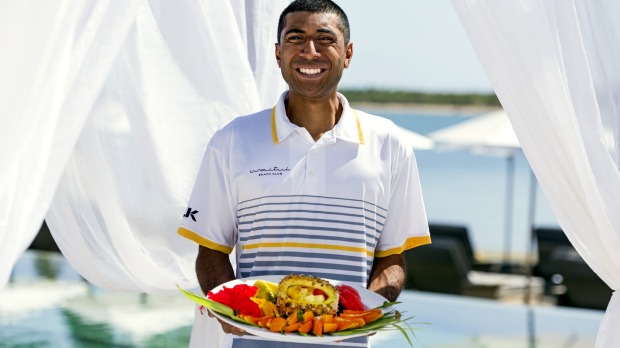
Fiji has come a long way from the sleepy South Pacific backwater Australians discovered in the 1960s. Since the beginning of the 2000s, international chain and boutique resorts have sprouted, offering a diverse selection of high-quality accommodation, from large family-friendly resorts to tiny luxury private islands.
A lot changed – except, until now, the food. Sub-standard facilities and handling at Fijian ports meant a lot of foreign produce needed to come in frozen and some didn't come in at all. And the country's land ownership laws and systems, among other factors, meant the farming community stuck to a narrow range of basic local crops. And in a low-income country with a small population and no tradition of dining out, there was no restaurant scene to speak of.
Of course the big chains and better resorts did the best they could with what they could get – and that was pretty good, really. But there was either the simple Fijian fare of curries and seafood, or there was international cuisine.
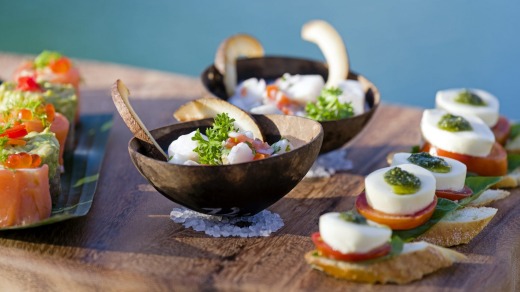
But now it seems everyone is upping their game to combine the two. There's a real excitement about Fijian resort food and some are leading the charge.
Outrigger Resorts is one of those. Blessed to have "the most decorated chef in Fiji" and head of the Fiji Chefs Association at the helm in Fijian-born Shailesh Naidu, as well as a general manager intent on giving Fijian employees the best training possible, there are exciting things happening in the kitchens of the 10 food outlets at Outrigger Fiji Resort, including its spectacular fine dining Ivi Restaurant.
Naidu says Outrigger's policy of training, encouragement and staff retention has seen its younger chefs getting much more passionate and creative. "We have always had a French and European influence in the kitchen but now a lot of chefs are combining it with what I call 'Pacific Rim freshness flair'."
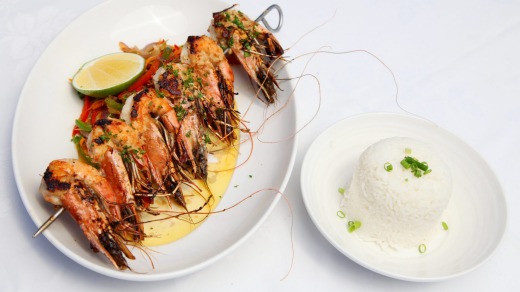
The result is a suite of menus rooted in Fijian tradition that bring the cuisine to a standard designed to surprise even the most finicky resort guest.
"I understand everyone wants to taste the cuisine of the country, but to enjoy it is another thing. Hence I incorporate our flavours, produce and style with a little twist in a fine cuisine fashion," says Naidu.
Naidu also has a unique relationship with local farmers, who he is encouraging to produce more exciting crops. "It's taking time but it's happening," he says. Outrigger has conducted "culinary workshops" to strengthen ties between Fiji's producers and the tourism industry and to educate growers in the concept of "farm to table".
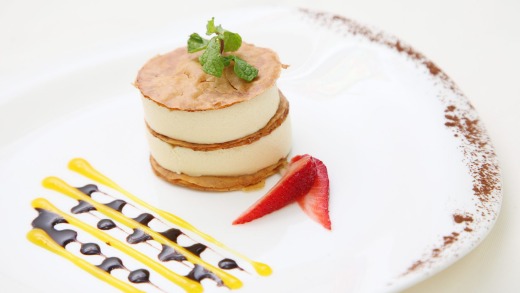
"Bear in mind almost all the chefs in big Fijian properties are Westerners," says Naidu, who has seen how that has intimidated farmers in the past. "I understand how this works, coming from a farm background myself. So I talk and present in our own local language and style, and our humble chat keeps these farmers at ease."
The result for Outrigger is a base of reliable producers keen to be part of the process. "A few are from our famous Valley Road and they do most of our salad produce. With some help from Asian farmers, they're trying herbs and other plants in addition to root crops and island vegetables."
Stuart Blair, on his third contract in Fiji, now as head chef for Sofitel Resort and Spa, says: "Before it was just okra, long beans and that kind of thing. But herbs and spices are being grown here locally now, lettuce, spring onions, and you can see much more of a variety because of the resorts' demands. They can see a market there so they're meeting it. Farmers are getting it together. Also with the fishing industry, there's been a lot more co-operation between the villages and the mainland. So we're getting fantastic quality fish such as snapper and mahi mahi. And I've really noticed the development of the mud crabs.
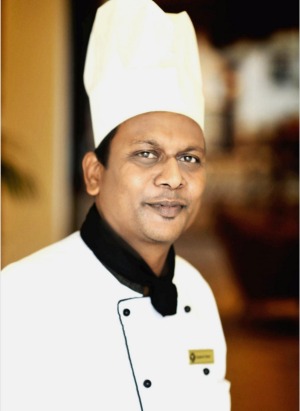
"Guests are after lighter meals that are higher in protein. They want the seafood. That's why the mud crab has taken off so well. They want cleaner and fresher food, more healthier options."
To that end, Sofitel now offers nutritionally balanced meals at its new Waitui Beach Club.
"Of course, we still do the burgers and pizzas and things, the resort food, but there are also cleaner and fresher options."
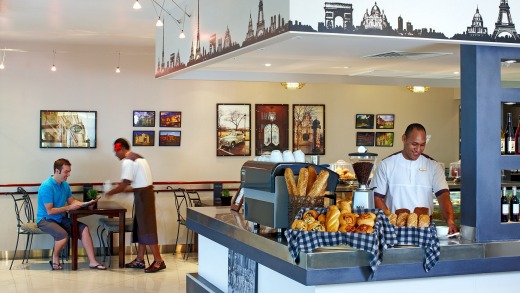
The 32-guest private island resort, Royal Davui, is known for its amazing Fijian cuisine, prepared by a kitchen run by Fijians. The resort has a striking advantage – the Southwick family who own it also own Fiji's largest commercial fish company.
"So before it goes off to Japan, we get to pick the best of the catch," says Chris Southwick. "We are all about local produce; Fijian ingredients rather than flying things in from around the world, which a lot of resorts are now doing.
"Fiji is very relaxed, very casual, and that's our resort. But it's also bloody good food because if you're on an island and the food is not that good, you're kind of screwed. The only thing that we buy that's imported would be the lamb from New Zealand, and beef from Vanuatu and then Asian greens. Everything else, if it's not grown in Fiji we don't use it."
But what his kitchens can now use has improved vastly, he says. "We can now buy cauliflower grown locally in Fiji. That's really exciting for us. They're growing jicama [a Mexican yam] and we love to use that."
Within that change, though, needs to be a deft balancing act. Mindful of what makes Fiji unique – being the Fijians – savvy operators have prioritised Fijian ways. While the imposition of Western hospitality ideas and standards has morphed other island locations into something that may as well be called "Generic International Tropical Place", resorts in Fiji have thus far managed to maintain strong cultural connections.
Royal Davui's Southwick is passionate about that. "That's where a lot of resorts need to be careful," he says. "I do believe the food in Fiji has improved, but I also believe some of the expatriate chefs have gone overboard."
Sofitel's Stuart Blair says: "It's really developing very quickly. I think after the government got stable the development was free to happen, and I think the next five years will be incredibly exciting. Hopefully we can still hold the traditions. You'll always have Fiji time."
A big part of those traditions is the strong Fijian sense of honour in welcoming strangers to their home, family and traditions. As Peter Hopgood, the general manager of Outrigger Fiji says, "The Fijian people are made for the hospitality industry. Their friendly and engaging nature is what every general manager looks for in his or her staff."
Combined with the world's best sunsets, white sand beaches, iridescent ocean, teeming coral reefs and a seductive climate, there really wasn't much to not love about holidaying in Fiji. And now we can love the food.
While Fiji isn't known for having a restaurant scene outside the resorts, the capital, Suva, has seen a real increase in restaurants recently.
Royal Davui's Chris Southwick loves the "beautiful cafe" Governors, in an old colonial building. "The food is really Fijian but with great execution. Also the Grand Pacific Hotel is doing great food. And there are little cafes popping up all over the place."
The Galley at the Royal Suva Yacht Club does a popular big breakfast, coffee and cake all day and an assortment of basic pub fare dishes combined with Fijian favourites such as curries and fish dishes, and the Five Princes Hotel restaurant does Fijian flavours with Western techniques.
The capital now even has a Mexican restaurant, Mamacita, promising "authentic Mexican dishes" and a wide range of tequilas.
See governorsfiji.com; grandpacifichotel.com.fj; thegalleyfiji.com; fiveprinceshotel.com, mamacitafiji.com.
fiji.travel
Virgin Australia flies daily to Nadi from Melbourne, Sydney and Brisbane. See virginaustralia.com.
Outrigger Fiji Resort; Sydney Drive, Sigatoka. Phone:+679 650 0044. See outrigger.com.